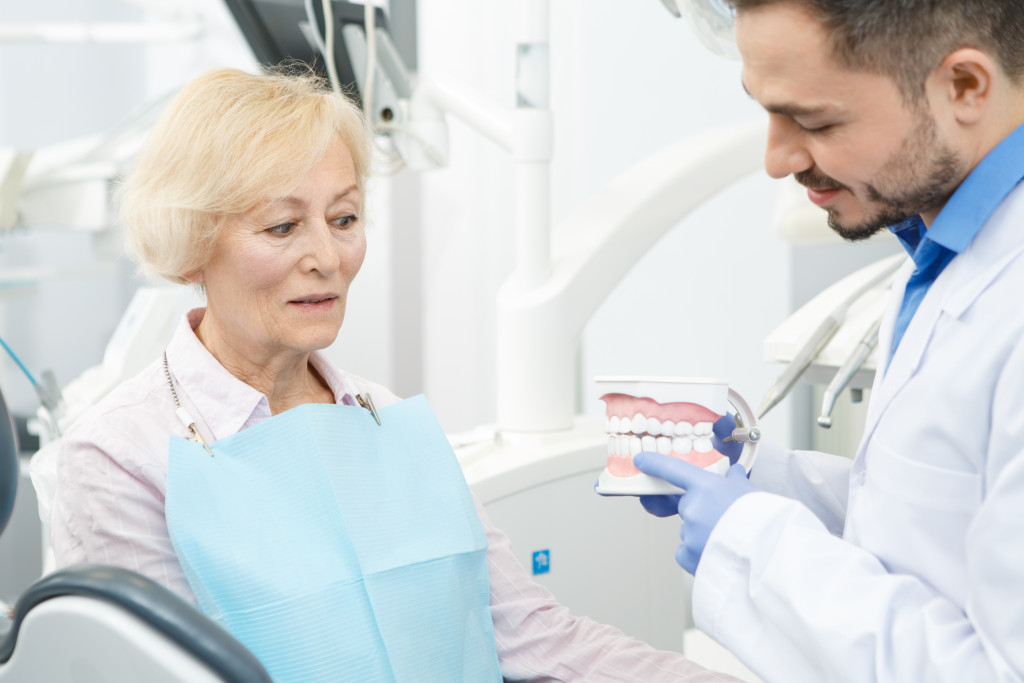Disclaimer: This website provides health information for educational purposes only and is not a substitute for professional medical advice, diagnosis, or treatment. Always seek the guidance of a qualified healthcare provider with any questions you may have.
- Regular dental check-ups are essential for seniors for oral health, and they must attend follow-up appointments.
- Caregivers and family members can motivate seniors to improve their lifestyles by encouraging oral hygiene and regular flossing.
- Assisting seniors with cleaning their dentures and retainers helps to maintain good oral health.
- Minimizing added sugar from sugary foods and drinks is essential to ensure seniors maintain good oral health.
As people age, maintaining good oral health is more important than ever. Unfortunately, many seniors face challenges such as reduced mobility and a lack of access to dental care that can make it difficult for them to keep their mouths healthy.
Fortunately, caregivers and family members can take steps to promote oral health in seniors. With these tips in mind, you’ll be able to ensure your elderly loved ones stay healthy inside and out!
Schedule regular dental check-ups.
Regular dental check-ups are essential for seniors to maintain their oral health. Over time, their teeth can slowly weaken and become more sensitive, leading to cavities and infections if not regularly monitored and treated. Even if seniors already have conditions such as gum disease or tooth decay, they must attend follow-up appointments to ensure their overall dental health is managed correctly.
Additionally, seniors should visit a reputable dentist who understands their needs and can discuss any changes in dietary habits they should follow or any preventative measures they should take. They can check websites such as idspringfield.com to find a good dentist in their local area. It is also essential to provide the necessary assistance for seniors who need help getting to their dentist appointments.
Motivate them to improve their lifestyle.
Here are some tips on how to motivate seniors to improve their lifestyles:
Encourage good oral hygiene.

Promoting oral health in seniors is critical to their overall physical and mental health. Seniors must brush twice daily with fluoridated toothpaste as this helps to reduce plaque and bacteria, which can lead to gum disease, decay, and tooth loss.
Proper brushing removes food particles and prevents the accumulation of sugary substances, which can contribute to increased cavities. Fluoride also helps to strengthen and protect against existing tooth decay. Regular visits to a dentist are also essential for making sure that any potential issues, such as gum problems and mouth infections, can be caught early and appropriately treated.
Floss daily and use an interdental cleaner

For seniors, regular and adequate flossing and daily brushing of the teeth are critical for maintaining good oral hygiene. Flossing helps to remove plaque and food particles stuck between teeth and is essential for preventing periodontal (gum) disease.
Seniors need to understand the importance of incorporating interdental cleaning tools such as a water flosser or floss picks into their routine. These tools can be handy for people with diminishing manual dexterity, crowns, bridges, or braces, and those with crowded, misaligned teeth. Furthermore, these interdental cleaners can help fight bad breath, which can plague many aging adults.
Assist in cleaning dentures
Properly assisting seniors with cleaning their dentures and retainers helps maintain good oral health. This is important as their dentures and retainers are major components of their everyday life. Ensuring they remain in good condition will help them enjoy meals and snacks, as otherwise, oral discomfort can arise.
Additionally, bacterial growth on dampened surfaces must be removed regularly to keep bad breath at bay. Taking the time to help our seniors and follow proper cleaning methodologies optimizes their overall wellness and quality of life.
Ensure sufficient intake of minerals
Maintaining good oral health is especially important for seniors, and ensuring adequate intake of key minerals such as calcium, vitamin D, and phosphorous can significantly impact this. Calcium plays an essential role in building strong bones and teeth while also aiding in muscle contraction.
Vitamin D helps the body absorb and utilize calcium, while phosphorous works together with calcium to form hard tissues that comprise teeth and bones, making them strong. Additionally, without enough of these critical minerals, the risk of tooth decay, gum disease, and other oral health issues increases. Therefore, seniors need to get enough of these key minerals through dietary means or supplements to ensure optimal oral health.
Avoid sugary foods and drinks
As seniors age, their risk for developing dental-related conditions increases due to various factors. To protect their oral health and prevent the onset of cavities, seniors need to reduce their intake of added sugar from sugary foods and drinks. If left unchecked, sugary treats can break down tooth enamel, leading to severe complications such as cavities, tooth decay, and gum disease.
For this reason, avoiding sugary items is essential to ensure seniors maintain good oral health despite age-related changes. Developing healthy nutritional habits now can also help minimize future oral hygiene issues and help improve overall well-being and quality of life.
These are just a few key steps caregivers and family members can take to ensure optimal oral health for their elderly loved ones. By taking the time to understand and address seniors’ unique needs properly, you can help them lead happy and healthy lives both now and in the future.




